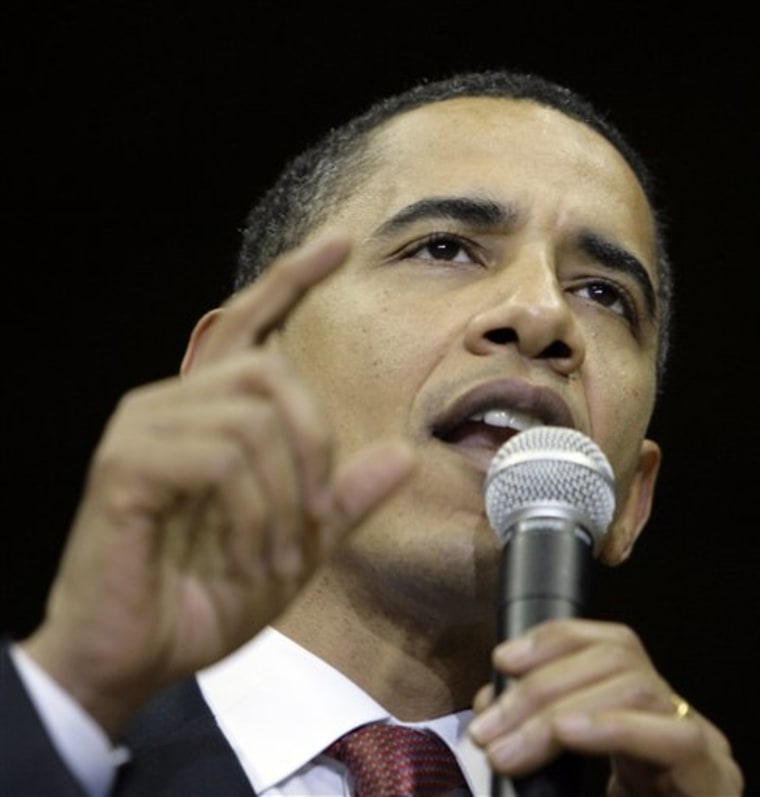Sen. Barack Obama, D-Ill., focused on Mississippi's primary for new momentum in his tight race with Sen. Hillary Rodham Clinton, D-N.Y., as a consensus began to emerge about two states stripped of their delegates where do-over contests could weigh heavily in the fierce Democratic White House battle.
Obama was favored to win in Tuesday's nominating race in Mississippi, a southern state where blacks — who have carried him to wins previously — make up a majority of the Democratic voters. The first senator trounced Clinton in Saturday's Wyoming caucuses, rebounding from earlier setbacks in a win that allowed him to retain his all-important delegate lead in his quest to becoming the U.S.'s first black president.
After a weekend break from public campaign events, both Democratic contenders were traveling in different directions on Monday.
Obama held a rally in Columbus, Mississippi, hoping to inspire potential voters in a state where 33 convention delegates are up for grabs.
At that same event, he rebuffed any notion of Clinton-Obama Democratic ticket, saying, "I don't know how somebody who is in second place is offering the vice presidency to someone who is first place."
Clinton, who campaigned last week in Mississippi, has an evening event planned in Scranton, Pennsylvania, the next major battleground in the campaign. The northeastern state's April 22 primary offers the biggest prize left in the nomination race: 158 delegates.
Clinton scored campaign saving victories in Ohio and Texas last Tuesday after 11 straight losses to Obama. Her campaign views Pennsylvania as friendly terrain, similar to neighboring Ohio. Both are industrial states with large numbers of white working-class voters and Democratic governors who are strong supporters of Clinton, who is aiming to become the country's first woman president.
In the overall race for the nomination, Obama leads with 1,578 delegates to Clinton's 1,468, according to the latest tally by The Associated Press. It will take 2,025 delegates to win the Democratic nomination at the party's convention in late August.
The Associated Press and NBC News conduct separate delegate counts. NBC's national delegate count currently stands at 1,230 for Clinton and 1,379 for Obama.
It is unlikely that either candidate would win enough delegates in the remaining contests to secure the nomination outright. Instead, they would need the help of the almost 800 so-called superdelegates — party officials and elected leaders who are not bound by state contest results — to secure the nomination.
The unexpected closeness of the race has created a headache for party leaders who are trying to figure out how to give Democrats in Florida and Michigan a voice after they were stripped of their combined total of 313 delegates for holding early contests in violation of party rules.
Although Obama currently has more delegates than Clinton, that could be eclipsed if the former first were to win a large enough portion of delegates from those two large states.
Clinton won both states, but no delegates. None of the candidates actively campaigned in either state, and Obama withdrew his name from Michigan's ballot.
Amid mounting calls from Florida and Michigan officials for new contests, a consensus began to emerge Sunday about holding a mail-in primary
"Every voter gets a ballot in the mail," Democratic National Committee chairman Howard Dean said on CBS television's "Face the Nation." "It's comprehensive, you get to vote if you're in Iraq or in a nursing home. It's not a bad way to do this."
Cost remains a main factor in the decision, with neither national nor state party officials agreeing on who would pay for a new vote.
On the Republican side, John McCain, a veteran Arizona senator and former Vietnam prisoner of war who wrapped up his party's nomination last week, was focusing on raising enough money to take on the eventual Democratic nominee in November's general election.
The Democrats have raised staggering amounts of money. Last month alone, Obama raised $55 million, and Clinton $35 million. McCain, in contrast, was on track to raise $12 million, according to his campaign.
McCain's schedule has been packed with fundraisers — he held five in two days last week — and he will continue to raise money in the upcoming week during a swing through the Midwest and the Northeast.
Also on his agenda: beginning the search for a vice presidential running mate, meeting with Republican congressional leaders to discuss his role in the Senate, consulting with advisers to lay the groundwork for specific policy proposals, and possibly making another trip to Iraq or Afghanistan to assess the situation.
A source familiar with McCain's plans said the trip would be for a week in mid-March to Europe and the Middle East; the source spoke on condition of anonymity because the Senate has not released details. McCain also said he hopes to meet with Gen. David Petraeus, the top U.S. commander in Iraq, before Petraeus gives Congress a status report on the war next month.
